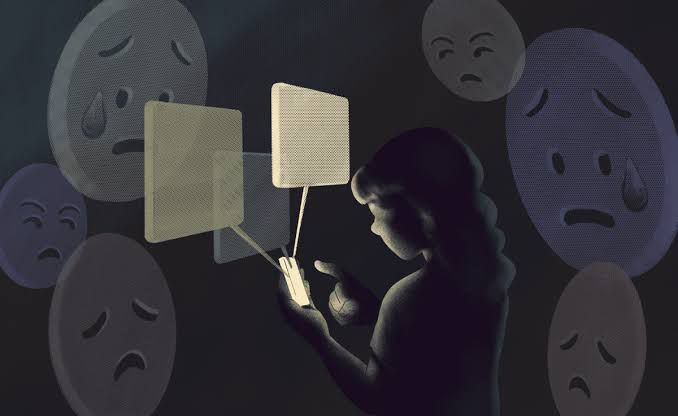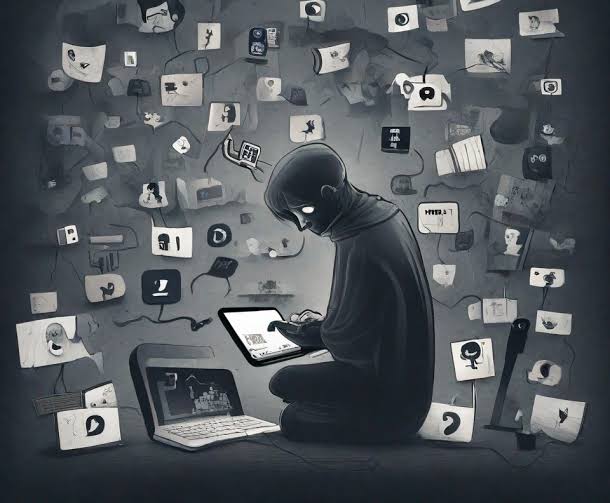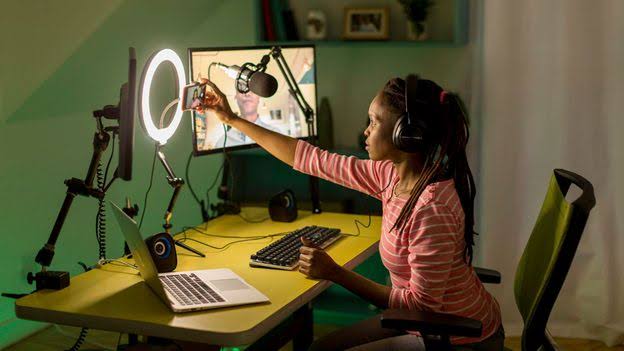The Dark Side of Influencer Culture

INTRODUCTION: Beyond the Filters
Beyond the filters, behind the camera is the new performance staged on social media, where carefully curated lives are showcased on screens, earning admiration and income. But the pressure to appear perfect starts to overshadow reality?
In an era where digital fame is a currency, influencer culture has evolved from light-hearted content creation into a high-stakes game of branding, burnout, and blurred ethics. Behind the filters and flattering captions lies a darker truth, one filled with mental strain, moral dilemmas, and a growing disconnect between real life and online personas.
Defining Influencer Culture
At its basis, influencer culture revolves around individuals who have mastered the art of commanding attention and monetizing it. These are not your traditional celebrities backed by studios or record labels. Instead, influencers are self-made digital personalities who are leveraging social media platforms to shape opinions and spark trends.
In Africa, this phenomenon has exploded over the past decade. With increasing internet penetration and smartphone access, a new generation of content creators has emerged into high consumable digital content.
The appeal is obvious: money, fame, brand deals, and visibility. What once required years of climbing through rigid media hierarchies can now be achieved with a viral trend and consistent content. Followers translate to influence. Influence translates to cash. And for many young Africans facing limited job opportunities and unstable economies, becoming an influencer offers not just a career—but an escape.
Yet, beneath this shiny exterior lies a culture often driven by performance over substance, virality over values.
The Pressure To Perform: Always “On”
Being an influencer isn’t just about posting pretty pictures; it’s about performance. And in today’s fast-moving digital world, the performance never ends.
From perfectly edited morning routines to curated “candid” moments, influencers are under constant pressure to deliver content that is not just appealing but algorithm-friendly. The line between personal life and performance blurs as every meal, outfit, or emotion becomes potential content. Social media doesn’t sleep, and neither, it seems, do those trying to stay relevant on it.
The cost? Mental strain, content burnout, and a deepening dependence on online validation.
A 2023 study by the International Journal of Mental Health and Digital Culture found that over 68% of African digital creators in Kenya experienced symptoms of anxiety and emotional exhaustion tied directly to content production schedules and algorithm pressure. The demand to stay visible, to post daily, respond to comments, join trends, and monitor engagement turns passion into pressure.

Social Insight
Navigate the Rhythms of African Communities
Bold Conversations. Real Impact. True Narratives.
Photo Credit: StudentExpresso
This emotional toll is often hidden behind aesthetics. Influencers smile through fatigue, post through personal struggles, and package pain as ‘inspirational content.’ The result is a digital stage where burnout is masked as hustle, and where stepping back feels like failure.
As the competition for clicks intensifies, creators are not just chasing trends—they’re chasing their own shadows in a race that has no finish line.
Lifestyle Inflation & Fake It Till You Make It
Behind the glam and glow-ups lies an uncomfortable truth: for many influencers, the lifestyle is often a lie. To keep up with expectations, creators feel compelled to live beyond their means, crafting an illusion of wealth and success, regardless of the cost.
This kind of lifestyle inflation isn’t just financially dangerous; it’s psychologically draining. The more they post, the more they feel pressured to outperform their last “highlight.” And because social media rewards perfection over authenticity, the pressure rarely eases.
But perhaps the most troubling consequence is how this illusion shapes perception, especially among younger audiences. To many of their followers, some still teenagers, the influencer's life appears effortless. Success seems instant. Struggles are invisible. And reality, distorted.
So in the race to appear successful, many are quietly breaking, emotionally, financially, and spiritually. But online, the show must go on.
When Influence Turns Irresponsible
With great reach comes great responsibility, or at least, it should. But in today’s influencer economy, the line between influence and manipulation is growing alarmingly thin.
As creators hustle to monetize their platforms, many slip into questionable promotions that haven’t passed a single safety test. When the goal is engagement and profit, ethics are often the first casualty.
In Nigeria, several influencers have staged fake giveaways, asking fans to repost endlessly for a chance to win—but the winners are never announced, and prizes never materialize. Even more subtle are the cases of misinformation from influencers packaged as truth. In a continent where digital literacy is still growing, this kind of influence has real world consequences.
The question lingers: Where does influence end and exploitation begin?
When personal branding becomes more important than public good, followers are no longer fans; they’re collateral damage.
Mental Health & Identity Crisis
Social Insight
Navigate the Rhythms of African Communities
Bold Conversations. Real Impact. True Narratives.
Behind the ring lights and curated captions lies a quieter, darker struggle, the erosion of self. For many influencers, the pressure to turn their lives into content eventually comes at the cost of their mental well-being and personal identity.
What begins as self-expression quickly morphs into self-surveillance. Every outfit, friendship, or emotion must be audience-approved. And in the constant pursuit of relevance, many creators lose sight of who they were before the likes started rolling in.
This identity crisis doesn’t just affect mental health; it affects relationships, self-worth, and even long-term career choices. Some are faced with anxiety, impostor syndrome, or even addiction to social media metrics. The dopamine highs of going viral often crash into long spells of digital silence and self-doubt.
So we must ask: What is the real cost of turning yourself into content?
When your life becomes a performance, is there anything left that still feels personal, true, or whole?
Impact On Followers: Distorted Reality
While influencers bear the burden of performance, their followers often absorb the consequences silently and subconsciously. As curated lives flood timelines, they begin to distort how young audiences perceive success, beauty, and self-worth.
Endless reels of luxury vacations, flawless skin, and six-figure side hustles create an illusion that everyone is thriving effortlessly. The result? A generation battling comparison culture, where self-esteem takes a hit from every scroll. FOMO (Fear of Missing Out) festers as teens and twenty-somethings question why their lives don’t match the filtered realities they consume daily.
Studies have shown a sharp spike in dissatisfaction among young social media users, with many citing social platforms as sources of insecurity, envy, and anxiety. Even more alarming is how consumerism, designer clothes, tech gadgets, and "soft life" accessories are increasingly sold as a path to identity and self-worth.
This culture doesn’t just fuel unrealistic expectations; it normalizes the idea that to be loved, you must be branded. That self-expression must be tied to spending.
And while some young users are learning to spot the illusion, many still measure their value by likes, aesthetics, and access to things they can’t afford, mentally trapped in someone else’s highlight reel.
Redefining Influence: Ethics & Authenticity
Despite its dark corners, influencer culture isn’t beyond redemption. Across the continent, a new wave of creators is quietly rewriting the status quo, choosing transparency over pretense, impact over illusion.
Influencers like Nigeria’s Eric Gugua, who regularly critiques opinions and gives insights on matters, are reminding us that authenticity still resonates, with content that isn’t just aspirational but honest, socially conscious, and rooted in shared experience.

Photo Credit: BBC
Social Insight
Navigate the Rhythms of African Communities
Bold Conversations. Real Impact. True Narratives.
To truly shift the culture, though, we need more giving examples. We need a collective redefinition of influence, guided by:
Media literacy, especially for younger audiences, to help them discern content from reality and learn to question what they consume.
Ethical influencing standards, including transparency in partnerships, fair representation, and disclosure of ads.
Mental health protections, from digital breaks to platform policies that include psychological support in influencer contracts.
Influence should not be a mask we wear to be loved, but a mirror that reflects truth, growth, and connection. Real power lies not in how many people watch, but in how well we use that spotlight.
It’s time to trade filters for freedom, aesthetics for authenticity, and performance for purpose. Influence can still be a force for good if we let it be.
CONCLUSION: Filters Fade, But Impact Lasts
Influence is more than aesthetics, more than engagement rates, more than going viral. It’s a tool; powerful, persuasive, and deeply personal. And like any tool, how it’s used determines its impact.
In a culture increasingly obsessed with the curated over the real, it’s easy to forget that what we post can shape how others live, feel, and see themselves. That’s why the responsibility lies not just with influencers, but also with followers. Engagement should be critical, not blind. Admiration should be earned, not engineered.
If influence is the new currency, then integrity must be its backbone. Because when the filters fade and they always do, what remains is the truth we chose to show or hide.
“Clout may trend, but authenticity endures. Influence means nothing if it comes at the cost of your truth.”
Recommended Articles
NBA Dominates Holidays: Christmas Viewership Soars to 15-Year Peak!

The NBA achieved its highest Christmas Day viewership in 15 years, with over 47 million U.S. viewers tuning in, marking ...
Reddit CEO Fires Shots: Steve Huffman Labels TikTok 'Parasitic'

Reddit CEO Steve Huffman has accused TikTok of being "fundamentally parasitic," citing significant privacy and security ...
Global Outrage: Political Fallout and Accusations Swirl After Bondi Beach Terror Attack

A terror attack at Bondi Beach during Hanukkah killed 15 people, sparking controversy over Labour donor Dale Vince's com...
You may also like...
When Sacred Calendars Align: What a Rare Religious Overlap Can Teach Us

As Lent, Ramadan, and the Lunar calendar converge in February 2026, this short piece explores religious tolerance, commu...
Arsenal Under Fire: Arteta Defiantly Rejects 'Bottlers' Label Amid Title Race Nerves!

Mikel Arteta vehemently denies accusations of Arsenal being "bottlers" following a stumble against Wolves, which handed ...
Sensational Transfer Buzz: Casemiro Linked with Messi or Ronaldo Reunion Post-Man Utd Exit!

The latest transfer window sees major shifts as Manchester United's Casemiro draws interest from Inter Miami and Al Nass...
WBD Deal Heats Up: Netflix Co-CEO Fights for Takeover Amid DOJ Approval Claims!

Netflix co-CEO Ted Sarandos is vigorously advocating for the company's $83 billion acquisition of Warner Bros. Discovery...
KPop Demon Hunters' Stars and Songwriters Celebrate Lunar New Year Success!

Brooks Brothers and Gold House celebrated Lunar New Year with a celebrity-filled dinner in Beverly Hills, featuring rema...
Life-Saving Breakthrough: New US-Backed HIV Injection to Reach Thousands in Zimbabwe

The United States is backing a new twice-yearly HIV prevention injection, lenacapavir (LEN), for 271,000 people in Zimba...
OpenAI's Moral Crossroads: Nearly Tipped Off Police About School Shooter Threat Months Ago
ChatGPT-maker OpenAI disclosed it had identified Jesse Van Rootselaar's account for violent activities last year, prior ...
MTN Nigeria's Market Soars: Stock Hits Record High Post $6.2B Deal

MTN Nigeria's shares surged to a record high following MTN Group's $6.2 billion acquisition of IHS Towers. This strategi...
